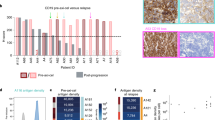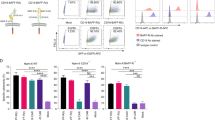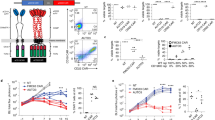Abstract
Chimeric antigen receptor (CAR) T cells targeting CD19 mediate potent effects in relapsed and/or refractory pre–B cell acute lymphoblastic leukemia (B-ALL), but antigen loss is a frequent cause of resistance to CD19-targeted immunotherapy. CD22 is also expressed in most cases of B-ALL and is usually retained following CD19 loss. We report results from a phase 1 trial testing a new CD22-targeted CAR (CD22-CAR) in 21 children and adults, including 17 who were previously treated with CD19-directed immunotherapy. Dose-dependent antileukemic activity was observed, with complete remission obtained in 73% (11/15) of patients receiving ≥1 × 106 CD22-CAR T cells per kg body weight, including 5 of 5 patients with CD19dim or CD19− B-ALL. Median remission duration was 6 months. Relapses were associated with diminished CD22 site density that likely permitted CD22+ cell escape from killing by CD22-CAR T cells. These results are the first to establish the clinical activity of a CD22-CAR in B-ALL, including leukemia resistant to anti-CD19 immunotherapy, demonstrating potency against B-ALL comparable to that of CD19-CAR at biologically active doses. Our results also highlight the critical role played by antigen density in regulating CAR function.
This is a preview of subscription content, access via your institution
Access options
Access Nature and 54 other Nature Portfolio journals
Get Nature+, our best-value online-access subscription
$29.99 / 30 days
cancel any time
Subscribe to this journal
Receive 12 print issues and online access
$209.00 per year
only $17.42 per issue
Buy this article
- Purchase on SpringerLink
- Instant access to full article PDF
Prices may be subject to local taxes which are calculated during checkout






Similar content being viewed by others
References
Smith, M.A., Altekruse, S.F., Adamson, P.C., Reaman, G.H. & Seibel, N.L. Declining childhood and adolescent cancer mortality. Cancer 120, 2497–2506 (2014).
Pui, C.H. et al. Childhood acute lymphoblastic leukemia: progress through collaboration. J. Clin. Oncol. 33, 2938–2948 (2015).
Rytting, M.E. et al. Augmented Berlin–Frankfurt–Münster therapy in adolescents and young adults (AYAs) with acute lymphoblastic leukemia (ALL). Cancer 120, 3660–3668 (2014).
Ram, R. et al. Adolescents and young adults with acute lymphoblastic leukemia have a better outcome when treated with pediatric-inspired regimens: systematic review and meta-analysis. Am. J. Hematol. 87, 472–478 (2012).
Faderl, S. et al. Adult acute lymphoblastic leukemia: concepts and strategies. Cancer 116, 1165–1176 (2010).
Kero, A.E. et al. Health conditions associated with metabolic syndrome after cancer at a young age: a nationwide register-based study. Cancer Epidemiol. 41, 42–49 (2016).
Essig, S. et al. Risk of late effects of treatment in children newly diagnosed with standard-risk acute lymphoblastic leukaemia: a report from the Childhood Cancer Survivor Study cohort. Lancet Oncol. 15, 841–851 (2014).
Topp, M.S. et al. Phase II trial of the anti-CD19 bispecific T cell–engager blinatumomab shows hematologic and molecular remissions in patients with relapsed or refractory B-precursor acute lymphoblastic leukemia. J. Clin. Oncol. 32, 4134–4140 (2014).
Topp, M.S. et al. Safety and activity of blinatumomab for adult patients with relapsed or refractory B-precursor acute lymphoblastic leukaemia: a multicentre, single-arm, phase 2 study. Lancet Oncol. 16, 57–66 (2015).
Topp, M.S. et al. Targeted therapy with the T-cell-engaging antibody blinatumomab of chemotherapy-refractory minimal residual disease in B-lineage acute lymphoblastic leukemia patients results in high response rate and prolonged leukemia-free survival. J. Clin. Oncol. 29, 2493–2498 (2011).
Davila, M.L. et al. Efficacy and toxicity management of 19-28z CAR T cell therapy in B cell acute lymphoblastic leukemia. Sci. Transl. Med. 6, 224ra25 (2014).
Lee, D.W. et al. T cells expressing CD19 chimeric antigen receptors for acute lymphoblastic leukaemia in children and young adults: a phase 1 dose-escalation trial. Lancet 385, 517–528 (2015).
Maude, S.L. et al. Chimeric antigen receptor T cells for sustained remissions in leukemia. N. Engl. J. Med. 371, 1507–1517 (2014).
Raponi, S. et al. Flow cytometric study of potential target antigens (CD19, CD20, CD22, CD33) for antibody-based immunotherapy in acute lymphoblastic leukemia: analysis of 552 cases. Leuk. Lymphoma 52, 1098–1107 (2011).
Lucio, P. et al. BIOMED-I concerted action report: flow cytometric immunophenotyping of precursor B-ALL with standardized triple-stainings. BIOMED-1 concerted action investigation of minimal residual disease in acute leukemia: international standardization and clinical evaluation. Leukemia 15, 1185–1192 (2001).
Sotillo, E. et al. Convergence of acquired mutations and alternative splicing of CD19 enables resistance to CART-19 immunotherapy. Cancer Discov. 5, 1282–1295 (2015).
Grupp, S.A. et al. Durable remissions in children with relapsed/refractory ALL Treated with T cells engineered with a CD19-targeted chimeric antigen receptor (CTL019). Blood 126, abstr. 681 (2015).
Gardner, R. et al. Acquisition of a CD19-negative myeloid phenotype allows immune escape of MLL-rearranged B-ALL from CD19 CAR-T-cell therapy. Blood 127, 2406–2410 (2016).
Haso, W. et al. Anti-CD22-chimeric antigen receptors targeting B-cell precursor acute lymphoblastic leukemia. Blood 121, 1165–1174 (2013).
Shah, N.N. et al. Characterization of CD22 expression in acute lymphoblastic leukemia. Pediatr. Blood Cancer 62, 964–969 (2015).
Nguyen, K. et al. Factors influencing survival after relapse from acute lymphoblastic leukemia: a Children's Oncology Group study. Leukemia 22, 2142–2150 (2008).
Wayne, A.S. et al. Anti-CD22 immunotoxin RFB4(dsFv)-PE38 (BL22) for CD22-positive hematologic malignancies of childhood: preclinical studies and phase I clinical trial. Clin. Cancer Res. 16, 1894–1903 (2010).
Kreitman, R.J. et al. Phase I trial of anti-CD22 recombinant immunotoxin moxetumomab pasudotox (CAT-8015 or HA22) in patients with hairy cell leukemia. J. Clin. Oncol. 30, 1822–1828 (2012).
Kantarjian, H. et al. Results of inotuzumab ozogamicin, a CD22 monoclonal antibody, in refractory and relapsed acute lymphocytic leukemia. Cancer 119, 2728–2736 (2013).
Chevallier, P. et al. 90Y-labelled anti-CD22 epratuzumab tetraxetan in adults with refractory or relapsed CD22-positive B-cell acute lymphoblastic leukaemia: a phase 1 dose-escalation study. Lancet Haematol. 2, e108–e117 (2015).
Chevallier, P. et al. Vincristine, dexamethasone and epratuzumab for older relapsed/refractory CD22+ B-acute lymphoblastic leukemia patients: a phase II study. Haematologica 100, e128–e131 (2015).
Raetz, E.A. et al. Re-induction chemoimmunotherapy with epratuzumab in relapsed acute lymphoblastic leukemia (ALL): phase II results from Children's Oncology Group (COG) study ADVL04P2. Pediatr. Blood Cancer 62, 1171–1175 (2015).
Grant, B.W. et al. A phase 2 trial of extended induction epratuzumab and rituximab for previously untreated follicular lymphoma: CALGB 50701. Cancer 119, 3797–3804 (2013).
Kantarjian, H.M. et al. Inotuzumab ozogamicin versus standard therapy for acute lymphoblastic leukemia. N. Engl. J. Med. 375, 740–753 (2016).
Xiao, X., Ho, M., Zhu, Z., Pastan, I. & Dimitrov, D.S. Identification and characterization of fully human anti-CD22 monoclonal antibodies. MAbs 1, 297–303 (2009).
Kawalekar, O.U. et al. Distinct signaling of coreceptors regulates specific metabolism pathways and impacts memory development in CAR T cells. Immunity 44, 712 (2016).
Chevallier, P. et al. Simultaneous study of five candidate target antigens (CD20, CD22, CD33, CD52, HER2) for antibody-based immunotherapy in B-ALL: a monocentric study of 44 cases. Leukemia 23, 806–807 (2009).
Olejniczak, S.H., Stewart, C.C., Donohue, K. & Czuczman, M.S. A quantitative exploration of surface antigen expression in common B-cell malignancies using flow cytometry. Immunol. Invest. 35, 93–114 (2006).
Kantarjian, H. et al. Inotuzumab ozogamicin, an anti-CD22–calecheamicin conjugate, for refractory and relapsed acute lymphocytic leukaemia: a phase 2 study. Lancet Oncol. 13, 403–411 (2012).
Long, A.H. et al. 4-1BB costimulation ameliorates T cell exhaustion induced by tonic signaling of chimeric antigen receptors. Nat. Med. 21, 581–590 2015).
Till, B.G. et al. CD20-specific adoptive immunotherapy for lymphoma using a chimeric antigen receptor with both CD28 and 4-1BB domains: pilot clinical trial results. Blood 119, 3940–3950 (2012).
Ramos, C.A. et al. Clinical responses with T lymphocytes targeting malignancy-associated κ light chains. J. Clin. Invest. 126, 2588–2596 (2016).
Guo, B. et al. CD138-directed adoptive immunotherapy of chimeric antigen receptor (CAR)-modified T cells for multiple myeloma. J. Cell. Immunother. 2, 28–35 (2016).
Ali, S.A. et al. T cells expressing an anti-B-cell maturation antigen chimeric antigen receptor cause remissions of multiple myeloma. Blood 128, 1688–1700 (2016).
Ritchie, D.S. et al. Persistence and efficacy of second generation CAR T cell against the LeY antigen in acute myeloid leukemia. Mol. Ther. 21, 2122–2129 (2013).
Borowitz, M.J. et al. Clinical significance of minimal residual disease in childhood acute lymphoblastic leukemia and its relationship to other prognostic factors: a Children's Oncology Group study. Blood 111, 5477–5485 (2008).
Borowitz, M.J. et al. Prognostic significance of minimal residual disease in high risk B-ALL: a report from Children's Oncology Group study AALL0232. Blood 126, 964–971 (2015).
Pui, C.H. et al. Clinical utility of sequential minimal residual disease measurements in the context of risk-based therapy in childhood acute lymphoblastic leukaemia: a prospective study. Lancet Oncol. 16, 465–474 (2015).
Grupp, S.A. et al. Chimeric antigen receptor-modified T cells for acute lymphoid leukemia. N. Engl. J. Med. 368, 1509–1518 (2013).
Jacoby, E. et al. CD19 CAR immune pressure induces B-precursor acute lymphoblastic leukaemia lineage switch exposing inherent leukaemic plasticity. Nat. Commun. 7, 12320 (2016).
Walker, A.J. et al. Tumor antigen and receptor densities regulate efficacy of a chimeric antigen receptor targeting anaplastic lymphoma kinase. Mol. Ther. 25, 2189–2201 (2017).
Watanabe, K. et al. Target antigen density governs the efficacy of anti-CD20-CD28-CD3 ζ chimeric antigen receptor–modified effector CD8+ T cells. J. Immunol. 194, 911–920 (2015).
Caruso, H.G. et al. Tuning sensitivity of CAR to EGFR density limits recognition of normal tissue while maintaining potent antitumor activity. Cancer Res. 75, 3505–3518 (2015).
Turatti, F. et al. Redirected activity of human antitumor chimeric immune receptors is governed by antigen and receptor expression levels and affinity of interaction. J. Immunother. 30, 684–693 (2007).
Qin, H., Haso, W., Nguyen, S.M. & Fry, T.J. Preclinical development of bispecific chimeric antigen receptor targeting both CD19 and CD22. Blood 126, abstr. 4427 (2015).
Lee, D.W. et al. Current concepts in the diagnosis and management of cytokine release syndrome. Blood 124, 188–195 (2014).
Weintraub, S. et al. Cognition assessment using the NIH Toolbox. Neurology 80 (Suppl. 3), S54–S64 (2013).
Stroncek, D.F. et al. Elutriated lymphocytes for manufacturing chimeric antigen receptor T cells. J. Transl. Med. 15, 59 (2017).
Stroncek, D.F. et al. Myeloid cells in peripheral blood mononuclear cell concentrates inhibit the expansion of chimeric antigen receptor T cells. Cytotherapy 18, 893–901 (2016).
Kalos, M. et al. T cells with chimeric antigen receptors have potent antitumor effects and can establish memory in patients with advanced leukemia. Sci. Transl. Med. 3, 95ra73 (2011).
Tembhare, P.R. et al. Quantification of expression of antigens targeted by antibody-based therapy in chronic lymphocytic leukemia. Am. J. Clin. Pathol. 140, 813–818 (2013).
Jasper, G.A. et al. Variables affecting the quantitation of CD22 in neoplastic B cells. Cytometry B Clin. Cytom. 80, 83–90 (2011).
Cibulskis, K. et al. Sensitive detection of somatic point mutations in impure and heterogeneous cancer samples. Nat. Biotechnol. 31, 213–219 (2013).
Acknowledgements
We gratefully acknowledge the study participants and their families, referring medical care teams, the faculty and staff of the NIH and the data managers involved with this work. This work was supported in part by the Intramural Research Program, National Cancer Institute and NIH Clinical Center, National Institutes of Health, by a Stand Up to Cancer–St. Baldrick's Pediatric Dream Team translational research grant (SU2C-AACR-DT113) and by a St. Baldrick's Foundation Scholar Award (D.W.L.). Stand Up to Cancer is a program of the Entertainment Industry Foundation administered by the American Association for Cancer Research. C.L.M. is a member of the Parker Institute for Cancer Immunotherapy, which supports the Stanford University Cancer Immunotherapy Program. The content of this publication does not necessarily reflect the views or policies of the Department of Health and Human Services, nor does mention of trade names, commercial products or organizations imply endorsement by the US government.
Author information
Authors and Affiliations
Contributions
T.J. Fry, N.N.S., R.J.O., D.S.D., B.D., D.W.L. and C.L.M. designed the study. T.J. Fry, N.N.S., M.S.-S., C.M.Y., C.D., B.Y., H.S., D.F.S., M.S., Y.F., P.W., S.M., D.W.L., T.J. Fountaine, J.F.S., L.Z., S.N., H.Q., P.W., S.R., R.G.M. and C.L.M. generated and analyzed the data. T.J. Fry, N.N.S. and C.L.M. vouch for the data and the analysis, wrote the paper and decided to publish the paper. No nonauthor wrote the first draft or any part of the paper.
Corresponding author
Ethics declarations
Competing interests
C.L.M. and R.J.O. are inventors on a patent for the CD22-directed CAR (US Patent and Trademark Office, 20140274909).
Supplementary information
Supplementary Text and Figures
Supplementary Tables 1–4 and Supplementary Figures 1–6 (PDF 4474 kb)
Rights and permissions
About this article
Cite this article
Fry, T., Shah, N., Orentas, R. et al. CD22-targeted CAR T cells induce remission in B-ALL that is naive or resistant to CD19-targeted CAR immunotherapy. Nat Med 24, 20–28 (2018). https://doi.org/10.1038/nm.4441
Received:
Accepted:
Published:
Issue Date:
DOI: https://doi.org/10.1038/nm.4441
This article is cited by
-
Prominent efficacy and good safety of sequential CD19 and CD22 CAR-T therapy in relapsed/refractory adult B-cell acute lymphoblastic leukemia
Experimental Hematology & Oncology (2025)
-
Design of sensitive monospecific and bispecific synthetic chimeric T cell receptors for cancer therapy
Nature Cancer (2025)
-
Antigen experience history directs distinct functional states of CD8+ CAR T cells during the antileukemia response
Nature Immunology (2025)
-
Be cautious to adopt a second CAR T-cell infusion after failure of CD19/CD22 cocktail CAR T-cell therapy in relapsed/refractory B-NHL
Cancer Immunology, Immunotherapy (2025)
-
Tonic signaling in CAR-T therapy: the lever long enough to move the planet
Frontiers of Medicine (2025)



